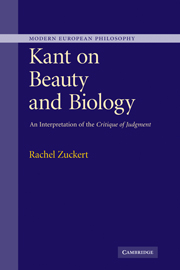1 - The problem: The unity of the diverse
Published online by Cambridge University Press: 22 September 2009
Summary
In the introductions to the CJ, Kant claims that his main concerns in this work – aesthetic judgment of beauty, teleological judgment of organisms, and various aspects of empirical knowledge from empirical concept formation to the representation of nature in a systematic natural science – are all products of the faculty of “reflective judgment,” the capacity to find the universal (i.e., a concept) for a given particular, rather than to subsume a particular under a given universal, the task of “determinative” judgment (v:179; FI, xx:211). Reflective judgment is, Kant claims moreover, governed by a transcendental principle, that of “purposiveness.” And, though Kant had previously discussed these topics in the CPR (even if only to dismiss some of them as unfit for transcendental philosophical treatment), Kant claims that they merit renewed critical attention because reflective judgment, governed by this principle, is necessary for the possibility of empirical cognition and of experience; correspondingly, Kant provides a “deduction” for this principle (v:184).
In these two opening chapters I shall be concerned with the shape of the CJ project as so introduced, i.e., with Kant's three main aims here: to introduce a new a priori principle as that of a newly identified faculty of reflective judging; to justify (judging in accord with) this principle as necessary for the possibility of experience; to argue that aesthetic and teleological judgment are cases of reflective judgment in accord with this principle.
- Type
- Chapter
- Information
- Kant on Beauty and BiologyAn Interpretation of the 'Critique of Judgment', pp. 23 - 63Publisher: Cambridge University PressPrint publication year: 2007



